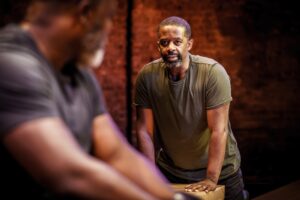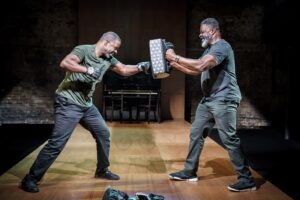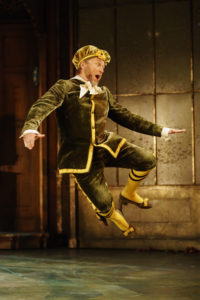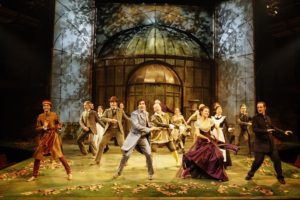Adrian Lester & Danny Sapani give an acting masterclass
★★★★★

Hymn, although it’s not spelled ‘him’, is a play about two men, two sons, and two brothers as it turns out. A bare stage with two actors provide possibly the best piece of streamed theatre I’ve seen.
It begins with a funeral. Gil, played by Adrian Lester, gives a eulogy to his late father, his hero. Now 50, he is the youngest child of four, the only boy, in the shadow of his older sisters and in awe of his late father. In the course of the play, we learn that his life has been shackled by following in his father’s footsteps as a businessman rather than being comfortable with being the kind but naive man he clearly is. And it seems his father was not the paragon he thought he was.
At the funeral, he meets Benny played by Danny Sapani. We soon discover he is an unacknowledged child of Gil’s father, born just a few weeks after him. Gil and Benny are drawn to one another. From then on, they are set on a road that starts with bonding and leads them hand-in-hand to disaster.
The two men satisfy a need in the other. Gil is pleased to have a younger brother, albeit by a few weeks, someone he can impress. Benny, who spent much of his childhood in care, has a connection with a dad and siblings for the first time. There’s a lot about the effect of dads on sons, or the lack of a dad.

Both have their demons and each boosts the other. They bond through music and dance. Lester and Sapani have fine voices and are good movers. The songs they sing pepper the story and, when they relive their 80s youth, it gives them a shared experience they never had at the time. The musically knowledgeable Benny calls it ‘sympathetic resonance’. The first song significantly is Bill Withers song that says ‘Lean on me when you’re not strong.’
In another scene Benny introduces Gil to a gym where he can unleash his frustration with his life.
For a while, it is wonderful to hear two men conversing about their lives and their feelings, relaxed and natural. But we know something must go wrong- the hints are there- and inevitably it does, but I won’t spoil anything by going into the details. Just to say, like any two people who blindly love each oither, they lead one another down this fatal path.
Adrian Lester takes us through many emotions as his character moves from confident to destroyed. His face, his voice, his eyes all transform— it’s a masterclass in acting. Danny Sapani too is excellent. I was touched by sensitivity and a puppy-like enthusiasm he conveyed, so apparently at odds with his bulky body.
The 90 minutes fly by. Lolita Chakrabarti’s script is so tight and so true. It’s interesting, I think, that, in a time when it is sometimes suggested that authors should not or cannot write about things outside their experience, a woman manages to make these men so believable.
It’s unfortunate that covid restrictions prevent the actors touching, because there are moments when they would have hugged or given one another a helping hand but the camerawork does well to suggest closeness.
In fact, this is a lesson in how to film a stage play, especially considering it is done live. It feels very like theatre- the bare stage designed by Miriam Buether tdoes just enough to suggest and leave the rest to our imagination, Prema Mehta‘s lighting and Blanche McIntyre‘s direction ensure we concentrate on the two characters and hardly notice that we are seeing it through a lens.
I was applauding at the end. I’m keeping my fingers crossed that a recording will be made available.
Hymn is streaming nightly until Sunday 21 February 2021. Tickets available from https://almeida.co.uk
Click here to watch this review on the YouTube channel One Minute Theatre Reviews




